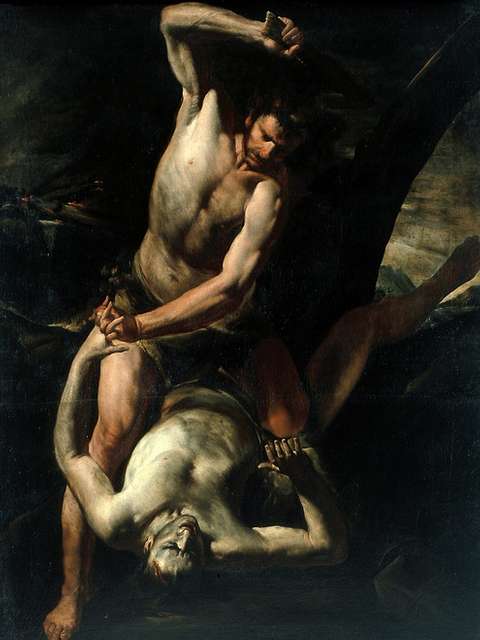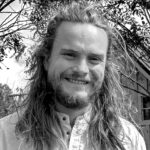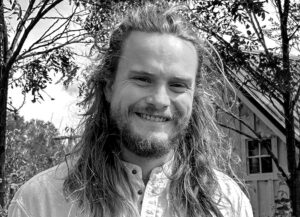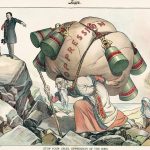The Birth of Cain
“Look, see! I have created man, like God,” she declared, and the second world began.
The feminine cries of childbirth and the cries of the infant’s first and friable breath converged into one strange and regal symphony that echoed against the desertifying landscape. New life entered the world with a splash, and a new world with new beliefs followed.
A land of food and sinuous streams and heaven’s undulating breath waving in the kissing canopies and banging lower-story branches that were really just swaying baskets of fruits and nuts and seeds and their birds and following bees became a decadence writ in blood. Eden had come to an end. The first breath hovered over Eden’s waters, but now everything had changed.
The coded scripts of our very human lives split, and double-stranded spirals of sugars known strangely, impersonally, as A, C, G, and T severed faithfully to form a future. Genetics describe a fine nothingness operating the coarse everythingness, and DNA’s sticky strings do a fine job animating the wet plunk of reproduction, the silent plop of gestation, and the volatile splash of birth.
The second world, the deserts outside of Eden, was our mythological beginning when genetic opportunity was its greatest and its simplest. Mankind in their haste to heighten themselves reduced the first world and its wonders into memory, mythology really, for what is memory but a place-infused mythology. We became lost gods when we stepped beyond our place and lost our humanity.
But we carried on, as we often do, and we kept walking and working and trying our best to cope with this new world, writ and wrought in blood. Birth’s bedlam was new to our species, and its chaos reminded Chava, or Eve, of creation itself—that explosion of heat and energy and hearts made finite in the infinite gravity of love both won and lost and time both had and never had. That moment when that which already was but not already known erupted through the unknown but now the seen and she felt for the first time in a long time at home.
She had long lived and wandered in the deserts outside of Eden and long had her Creator’s words echoed through her mind.
“Multiply,” the heavens once thundered, and, holding her first-born firmly in her lap, she looked heavenward, absentmindedly, and saw nothing but its deep blue and cumulus white quietness, uncomforting stillness. She was alone. And she was lonely. But now less so.
Her memories arrived from the west, like a gale, then blew swiftly on. There was no warning; no patterned rationale that triggered them. Just dust and its tired desert beating like pins against her tent. She spent her evenings, lately, standing in its entranceway, the need to run, to leave, to rebel against herself, to let go, to escape the desiccated, musky, but increasingly familiar space.
Escape, her mind screams. Run, her gut echoes. But she never did. She never could, her feet, like fruit trees planted in this second world. Chava often brings one of their fruits to her face, like a mirror, and inhales its deep red, sharp, acidic bite that sits just before her lips. She holds it for a moment and then throws it aside, its red world bounces and rolls into the dark corners of the tent. It rots but is never forgotten. It fetches distant images to her mind: sodden turf under never ending groves of trees, their dwindling, green-red leaves that hold onto summer like she used to hold onto his side, her hand in his, their hips tessellating like stars. She sees her kitchen just beyond the grove, the woodsmoke, the full table, again his smile.
Thoughts and memories fill her up like the garden once filled her up—with purpose. Keep your mind on your work, she says to herself, inaudibly, as her hands thread, familiarly, goat and camel hair into a woven patchwork, a new cover for her aging shelter and, if she can get to it, a warm cover for her babe. Keep your mind, she whispers to herself. Her hands work harder.
The scream of her infant pulls her back into the tent, the moment, her own dust-covered and blood-scarred body. She releases her memories like she released the apple and they dissipate at the tent’s flaps and blow away in the gale, to the east, and she turns inward once more into the dimly lit space. Blood and amniotic fluid create dark, powdery lakes around her bed, and a rough cradle rests to the side. It is built from dried reeds that rest atop the green, spring branches of olives and wild plums, and sabr pads she collected during the winter clothe its base for protection. It could have been better done and better built, but it will have to do, she thought.
“At least the wonderful blue remains with us,” she confessed as she held the crying infant in her hands, still unsure how to hold such a life. Still unsure how to calm it down. How does she calm herself down? She is still working through that. The smell of rotting apples, their putrid stain, cuts through the dull tent air and suffocates her.
Chava returns to herself and looks down, her hands fumbling for the edges of the camel wool blanket, the only covering she had for her child, and she wrapped him as she remembered being wrapped by the garden’s loving breeze: completely and tenderly. But the desert sands billow against her tent’s flap, and their piercing waves and angry torrents drown her again in thought, painful memory and lost loves, their endless depths overtaking and overwhelming.
What is the point in all of this, she thought. Does life exist just to carry on? Does life exist at all?
“Multiply,” the thunder again echoes across the flat, stormy plain where her tent sits alone, like a fat pimple ready to pop on an otherwise unmemorable face.
Everything changed when his name flowed from Chava, like blood from a wound. She felt more at home, less lonely, when she saw what her body long knew, and she named him Kayin, or Cain, a word related to kanithi and from the root kanah, meaning to possess. Chava, like god, created so that she may possess and, also like god, Cain possessed so that he may create. Humankind’s mathematical plop carried on, memories be damned.
“Look, see! I have created man, like God,” her voice again echoes across the tent, and this time it is picked up by the winds beyond and carried, like a spiral torrent, a tornado, vast distances.
Who can blame her? She conceived, she worked, she bore, and then she held that which she conceived, like god. Naked but unafraid, life continued one more step, one more gentle and blood covered cry.
Chava was not alone.
The Birth of Abel
The birth of Chava’s second son lacks both a timeline and the fanfare that surrounds her first. She does not celebrate; she does not even name him. The text stumbles over those details like a mystified drunk stumbles over a curb or a mystified, forest traveler stumbles over a root. Did she hold him? Did she even clothe him?
The ancients simply state that Cain’s brother is born and that Cain’s brother is named Havel, or Abel. The excited animation and mystified ceremony of Cain’s birth has long dissipated across the lonely desert, like salt over too much meat that is beginning to rot. Known by association alone, Havel’s name means “breath that vanishes” or, perhaps, “a vapor of smoke.”
Yes, we know breath and vapors associatively and never directly, and so it makes sense that the text does what it does and the story goes how it goes. Breath is the manifestation of something else much greater, much stronger, much more real. The energy of exhale, breath dissipates proportionally to its ability to be known and our story follows.
After periods unknown, Abel becomes a keeper of sheep and Cain becomes a tiller of the ground. Where is Chava? The story leaves her in the dust. That is the strange thing about genetics, you know. Like Humpty Dumpty, once they diverge you can never put them together again.
Where is their father? Where is Adam? In the ancient language, Adam is ha’adam, or “the man.” Interestingly, ha’adam is ancient wordplay and is connected to ha’adamah, meaning “the earth.”
The man. The Earth.
In this way, mankind (and Chava’s “Adam”) in the book of Genesis is more properly translated as earthling. But the earth and its earthlings are not separate entities, for “Adam is the land, and the land is merely an extension of Adam,” writes Rabbi Michael Paley. When humankind is punished in the Garden, the land is the focus of Creator’s wrath, the curse striking the earthlings “at the center of their being,” again writes Paley. Adam, the personal noun, does not appear in Genesis until late in chapter four (4:25), which is long after our story ends.
Where is Adam? He is here, here as the desert plane in which our story dwells and here as the desert winds that hammer, that pierce, that cry against the night, like its newborn child.
Today’s green movements—whether in agriculture, energy, or business—are often hailed as efforts to reconnect. One thought leader recently said on social media that, in these green movements, “we are reconnecting to each other; we are reconnecting to nature.” Thousands line up to like and comment and share the post, but the earthling, the earth, billows and flashes and tears against our delusion of disconnection, weeping like Creator wept.
When we dig in the soil and lift it up to inspect it, to sift through it, to attempt to understand it, does it become something else? Disconnected from the soil beneath your feet, does the soil in your hands transform into something that is not soil? This is the delusion. Our green movements seek reconnection because they fundamentally believe that we have, in our separation, become something else, some other structure.
Unlike the soil in our hands, the supposed solution to our separation is regeneration. Yet the real solution is just to let it go—to release, to let it splash downward and ripple, a wave in a pond, across what it already is: itself.
We return to ourselves when we pause, when we drop everything, and splash against that which we already are—earth. We are her earthlings. No reconnection is necessary. Just breath, or a “vapor of smoke.”
Our violent, desert storm is not necessarily a call for regeneration and its “reconnection” as much, I think, as it is a call for our blood and our tears.
“Earthlings,” Creator calls to us, naming our identity despite the masks we often wear that cause us to appear as industrial capitalist or savior of the world who then seek reconnection. You cannot separate earth and its earthlings, we know deeply, but we do not remember. Our memory is the problem.
Where is Adam? They are here. Will you join us?
Just breathe.
The Keeper, The Tiller, The Question
Like the sound of spring mountain water, the brothers’ occupations speak of their creation stories.
Abel is described as the keeper of sheep. The word keeper is ro’eh and means shepherd. Derived from the root rah, it is thereby connected with companionship. It could be written that Abel was with the sheep as it could be said that I am with this spider that last night spun its web in the corner of my writing shed’s eastern window. We together occupy the space in which we are, and we do so willingly, and we do so quietly.
In the first book of Samuel, ro’eh describes a seer, a prophet who understands what others cannot see, and so it also could be said that Abel is a shepherd who accepts the day as the eastward dawn accepts the sun and as this spider accepts my presence—what a wonderful web she has spun. Abel’s life is a vapor found in the subtle convergence of passing moments going about their day. Abel wanders as the sun wanders.
Cain is described as a tiller of the ground. Belonging to a root that means to work, a thing unearthed when force tethers control to its own will, Cain becomes a noun meaning slave to or worshiper of. He is they who possess through force; they whose work becomes their master; and they who, as Henry David Thoreau wrote about in Walden, “labor under a mistake” and are “soon ploughed into the soil for compost.” Cain’s dominion requires sophistication. It requires an unremitting dedication to tomorrow through a maximized today. In some true sense, his dominion demands a worshiping of the soil and the corresponding slavery to that which the soil produces—cultivates, really.
Beliefs long held become mythology. The beginning breath and beliefs of our world speak of the contest between he who possesses and he who cannot be possessed.
Our story continues when Cain makes an offering to Creator and Abel follows. It is important to consider that Cain goes first—it was his idea to offer the life of his work, of his hands, as a sacrifice.
For Abel, it seems, wandering requires following, which, it also seems, requires a vision hitched to singularity. That is, with one vision, shepherds follow sheep and prophets follow truth, wherever they may go and whatever they may be.
But Creator admonishes Abel’s sacrifice and rebukes Cain’s. Creator accepts Abel’s harvest of his first-born lamb and rebukes Cain’s yield of his fruits. Why? What is the difference between these two sacrifices? That is the wrong question, I think. The Creator created and did so willingly and did so in patterns and reciprocity—meaning equally and with equal regard to equality—and so is there really a difference between a lamb and a morsel of fruit in the eyes of their Creator?
Perhaps, the real question has nothing to do about the difference between tomatoes and lambs, fruits and meats. Perhaps, we have missed something entirely more real, something entirely more true. What if this story has nothing (or little) to do with sacrifices and everything to do with the position of the sacrifice?
The most far-reaching development in human history is not the proclivity towards tools or the advent of agriculture or the internet or, really, even the domestication of fire. Today, artificial intelligence pierces into our psyche to see what it can learn. But this is also not important. These evolutions in our creative capacity and creativity in general are not a set of semantic propositions that govern our propulsion through our time, like westerly winds over water or strong words in constitutions and lawbooks. Neither do they guarantee our species’ dominance or safety amongst the torrents of actual life. Rather, the most far-reaching development is, simply, the reach of humankind—the human ascendency into the heavens, as gods.
The ancients focused on Cain’s fruits being “of the soil” and Abel’s harvest being “of his flock.”
Abel experiences the world as it is, for keepers of sheep follow and protect. Cain changes the world to experience what could be, for what emerges from the soil is both directable and controllable. Abel accepts what is; Cain demands what could be. And while we do not know the primary reason Creator rebukes Cain and approves Abel, although much has been written with great authority in the Mishnah and the Midrash, we foreigners can merely read Creator’s words and can merely stumble into a loose understanding of them, like drunks over curbs.
The text reads:
Why are you incensed,
and why is your face fallen?
For whether you offer well,
or whether you do not,
At the tent flap sin crouches
and for you it is longing
but you will rule over it.
This is something most strange. Creator responds by dismissing the particulars of Cain’s sacrifice and talks instead of tent flaps and sin lurking beyond their wafting and woven goat-hair walls. Creator talks about ruling over sin as Cain rules over the soil. Creator talks about fallen faces and crouching and longing and ruling.
Louis Ginzberg’s The Legends of the Jews, a modern retelling of aggadah from hundreds of biblical legends in the Mishnah, Talmud, and Midrash wrote that Cain “ate his meal first,” and then, his appetite satisfied, “offered unto God what was left over, a few grains of flax seed.”
The question the ancients are calling to our attention is, at least in part, not about the offering or what it contains but the offeror’s position in the story. Cain’s paradigm is the harvest. His name demands servitude to possession, a worshiping of the soil’s production for his own sake. He transmutes earth’s beauty from a wonderful and living cycle in which humanity is but one small aspect into a mixed labor in which we must rise up and become gods ourselves—creators and audacious characters in the story of the world.
But it is not our world like the sun is not our sun or that tree is not just our exhaled breath being reborn into something warm. Cain plants seeds in rows in order to grow nourishing fruits and their medicinal roots, and he does these things in order to harvest their abundance. His movements are methodical steps that eternally progress in one direction: a yield and a meal.
Why does sin crouch at our door? Why does Creator talk about ruling over it? First, we must put down our dinner plates.
Many have argued that this story is a story of pastoralists and agriculturalists. It is about the coming demise of agricultural peoples.
From Daniel Quinn’s Ishmael to John Steinbeck’s East of Eden, this is a story of humanity choosing the wrong path. Just look at the history and ensuing agricultural developments of the last 10,000 years, some argue. The rise of agriculture, to a large degree, is the rise of desertification, of famine, of erosion, and of our warming earth. But these folk speak at conferences energized by coal, they live in houses erected by falling forests, and they consume bubbly, summer drinks in aluminum cans that require five hundred years to decompose. More interesting to me is the energy required to produce their refreshing, sparkling sips: one aluminum pop-top can requires 1,643 calories of energy to produce and delivers less than 1 calorie of energy to its consumer. Agriculture is the problem, some write.
But agriculture has also allowed mankind to progress from the State of Nature into a safe, democratic, pious, and aluminum-contained-and-bubbly-drink infused State of Civil Society, to loosely paraphrase our species’ enlightenment thinkers. Agriculture is the progressive step that allowed civilization, language, and leisure to emerge and become etched in the political, social, and religious fabric of our lives. Agriculture is the solution, others write.
But is this true? Is either true? Is agriculture good or bad? Did agriculture arise from a lesser state of human creativity and occupancy?
Both Quinn’s and Steinbeck’s positions demand a linear sense of history. That is, before agriculture we had something else, let’s call it pastoralism. Before pastoralism, agriculture was nowhere to be found, never to be found. But, like ocean waves, the rise of agriculture, I think, is like the rise of anything else. It pulls in slowly and then, out of nowhere, it crashes instantaneously, that is inevitably, and then it recedes again. Like ocean waves, agriculture is nothing but a flash of energy that tessellates within the gapless and perfectly whole rhythms of stardust to souls to stardust once more. Our history is the trees and the rivers and the lost seeds of our ancestors that are also like ocean waves, themselves nothing but momentary and cyclic bursts of the moon’s not-so-distant energy, waiting to be reborn.
Can energy be linear? We understand energy as waves on some spectrum but even waves recede after their great crash, only to return once more. Life is cyclic, and its cyclic and energetic pulse pulls and crashes and recedes only to pull once more. What if agriculture is a denizen of this dance and cycles in and out, like ocean waves, of our human world?
Like ocean waves, life can never be linear. Creator speaks, “whether you offer well, or whether you do not,” sin lurks beyond the door. The offering, as our story goes, seemingly does not matter, as the debate between pastoralism and agriculturalism does not matter. It is reductionistic, and like modern science it forces the sinuous curves of the mother tree into the straight lines of the paternal ruler—measuring and marking and felling.
And so, what if this was not a story of agriculture or pastoralism but a story about the heart of the harvest? Long has life cycled through its operational methodologies, for “that which was is that which will be,” writes Qohelet in Ecclesiastes. But even Qohelet, the son of David and king in Jerusalem, begins his earthly work with the words, havel havalim, or, “merest breath, all is breath.” Yes, Abel, or havel, is here with us again, for “that which was is that which will be.” Abel may be dead, but he is not gone.
Choice and the cycles of our nature can never be linear. What if we treated earth as creative and playful, as a lucid land of lurid love that sometimes looks like pain? What if the epic of our mythology was not a story of some idyllic fall but how our species became entrapped by the sin lurking at our door, just beyond our dinner plates?
I believe our story is a story of episodically contested paradigms, not practices. Cain plants and Abel walks. Cain lives in earth’s womb and Abel lives on that which she calls forth: vegetation. Agriculture and pastoralism are not that different, for both equip life with nourishment. Is nourishment bad? It is important to consider that both Cain and Abel existed simultaneously and that, if anything, Abel, the “pastoralist” was the second born and Cain, the “agriculturalist” came first. But this fact is completely missed by modern writers, like Daniel Quinn, who look to disturb the modern conscience and not to equip life with actual power.
The real difference, which is also, I believe, the potent portent of our story, is that Cain’s abundance requires possession whereas, like breath on fire, Abel’s abundance is never had but ignites a heavy and permanently ethereal and sacred smoke. While Abel’s way is open, Cain’s way is closed; while Abel’s way is complex, Cain’s way is complicated; while Abel’s way is as the wind, Cain demands a sail; and while Abel accepts what is, Cain wants a better way, his way, and in his time.
Sin crouches at his door because he has one. Abel is lost in the meadow.
His offering rejected, Cain’s anger kills Abel and Creator curses Cain to be a restless wanderer over the earth. He curses Cain to be nothing at all, like breath.
The earth quaked and ruptured below him. Great caverns opened, like torn blood-crusted wounds, and mammals conjoined with the birds of the air and the bugs of the bogs and they essayed to consume him, to avenge the blood of Abel that yet welled across the capped and compacted desert dust. Cain trembled and fear overtook him. He cried out to Creator.
But Creator’s curse was not yet complete. As the blood of Abel never rests, as it is written, Cain was then cursed to wander eternally—a shepherd without a flock, and a life without its death. His soul walks for no end, it works for no product, and it grows for no harvest. His feet the soil strike, but the soil provides no shade, no community, no food. His curse was to become Abel but never to die; to walk without purpose; to live in wildness but never to become it.
“At the tent flap sin crouches” now echoes eternally across the dim and desertified landscape that is also our landscape and that is also drifting eastward of Eden. We modern Cains drift endlessly between the land of our primordial birth, Eden, and the east, the horizon of rebirth, the darn-darkness of our smoldering and second world.
Which way will we wander? Perhaps, like Abel, our souls will wander like the wild coming home, drifting like vapor and affecting a strong dominion like subtle breath. Perhaps, like Cain, our bodies will wander for no reason at all, lost in the churned beauty of the vagrant and tilled fields of Nod.
Look, see! We have created our world, like god.
Yes, but look, see. The sun is rising.
Image Credit: Gioacchino Assereto, “Cain and Abel” (1640-1650) via Picryl







